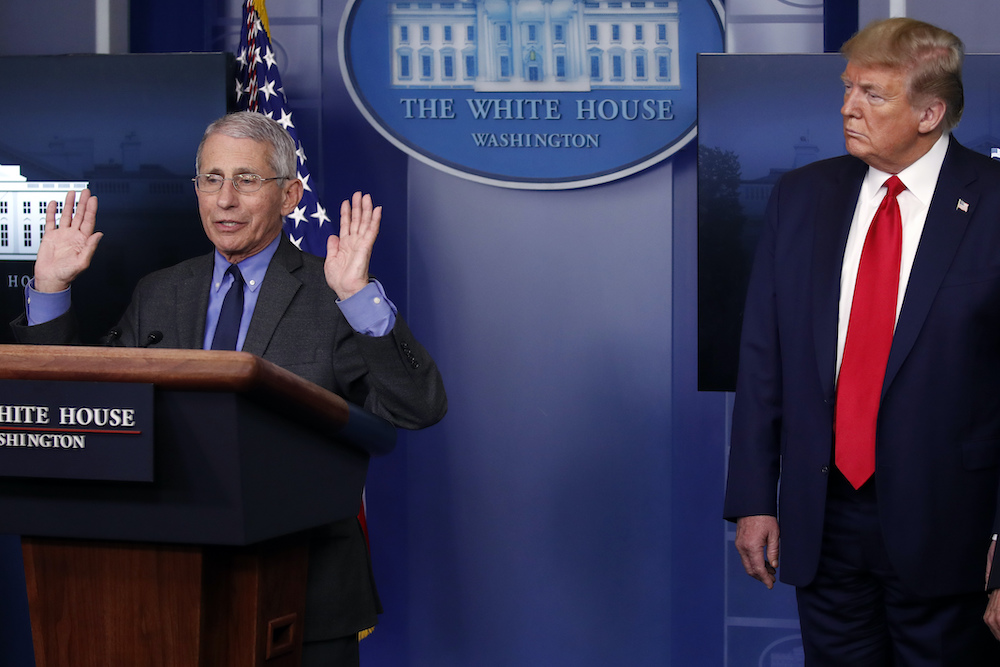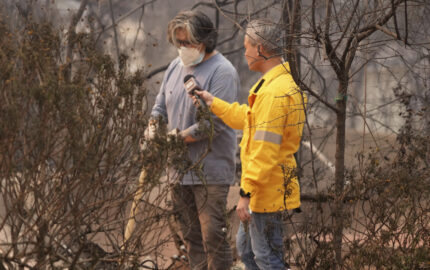Was it reasonable to wonder if President Donald Trump began restricting, but not banning outright, travel from China on January 31 because of xenophobia rather than to avert the spread of the coronavirus to the United States? If context means anything in journalism, the answer is a resounding yes. To deny the legitimacy of the question helps the Trump administration mislead the American public about how his White House has responded to this growing crisis.
“I was criticized by everybody,” Trump said during the April 13 coronavirus briefing in reference to his China travel decision. “In fact, I was called xenophobic.”
No one who has spent any time watching the president’s daily briefings should have been surprised by what the president did Monday. He began by trying to get Dr. Anthony Fauci, director of the National Institute of Allergy and Infectious Diseases, to contradict what Fauci had told CNN’s Jake Tapper over the weekend, that quicker action likely would have saved more lives.
Then Trump played a propaganda video that included a number of friendly voices praising the president’s response to the coronavirus, as well as a clip from The New York Times podcast “The Daily” in which White House correspondent Maggie Haberman discussed Trump’s partial China travel ban. The out-of-context clip made it seem as though Haberman was lavishing praise on the president’s decision by calling it “effective.”
Haberman was right to push back on Twitter, saying the clip failed to include her comparing the move to President George W. Bush’s infamous “mission accomplished” moment. But she should also have dealt with the xenophobia claim. Even the best journalists repeatedly make this mistake — treating issues of potential racism and xenophobia as side issues rather than fully examining their relevance as part of a broader, more complex story.
Here is the relevant exchange between “The Daily” host Michael Barbaro and Haberman during a March 25 episode of the podcast:
Haberman: The idea was to halt the spread of the disease, keep transmissions to a minimum. He was accused of xenophobia. He was accused of making a racist move. At the end of the day, it was probably effective, because it did actually take a pretty aggressive measure against the spread of the virus. The problem is, it was one of the last things that he did for several weeks.
Barbaro: Hmm. So the right decision in retrospect, but not accompanied by similar actions that might have contained transmission.
Haberman: That’s exactly right. In the same way that George W. Bush was criticized for his “Mission Accomplished” banner about Iraq, the president treated that moment as if it was his mission accomplished moment. He did not do anything after that in terms of alerting the public, or telling people to be safe, or telling people to take precautions. And it basically squandered several weeks within the U.S.
That exchange on “The Daily” showed that the Times did not challenge Trump’s assertion that it was out-of-bounds or wrongheaded to question his motives to restrict travel from China. And it left the false impression that Democrats, such as Senate Minority Leader Chuck Schumer and presumptive Democratic presidential nominee Joe Biden, called the move xenophobic, though neither man did.
Haberman said Trump had been accused of such things but didn’t specify who was doing the criticizing. Trump’s describing the virus as “Chinese,” which was also widely seen as xenophobic, also went unexamined.
It is right to question every move Trump makes concerning a nation of mostly black or brown people. Why? Because he kicked off his campaign calling most Mexican immigrants criminals and rapists.
Because during the 2016 presidential campaign, he proposed a total ban on Muslims entering the U.S.
Because he said the ethnic background of a federal judge presiding over a case involving Trump made him biased.
Because he called African countries and Haiti “shitholes” and seemed to prefer immigration from mostly-white countries.
Because of his administration’s immigration policy point person’s history of reliance upon white nationalist and white supremacist outlets to shape his thinking on immigration.
None of that becomes less relevant because some, but not nearly all, experts believed the January 31 decision by Trump to curtail travel from China might have initially slowed the spread of the virus in the U.S. In fact, that history becomes more relevant, given that there’s reason to believe the virus reached New York from Europe, not Asia, and that hundreds of thousands of travelers from China have made their way to the U.S. since that partial travel ban was implemented.
Also, despite the rise in the harassment of Asian-Americans, as indicated by a “sharp increase” in Covid-19-related discrimination calls to the Commission on Human Rights in New York, the Trump administration spent weeks insisting on using “Chinese virus” or “Wuhan virus” to rebut Chinese propaganda that falsely accused the U.S. of being the cause of the virus. The rift was part of the reason it was difficult for G-7 nations to make a joint statement about their fight against the rise of Covid-19 cases.
Though it was wrong for Trump to pull Haberman’s words out of context and distort their meaning, it is also clear that journalists must get better at understanding the relevance of race and ethnicity, even for stories that on the surface seem to have little to do with either.
Maybe most important is the message this sends to the American public. If journalists don’t do a thorough job of helping Americans understand the complexity of such issues, they might be less likely to adopt the lessons from countries that have handled this pandemic the best – particularly when those countries are Asian.
“I was criticized by everybody,” Trump said during the April 13 coronavirus briefing in reference to his China travel decision. “In fact, I was called xenophobic.”
No one who has spent any time watching the president’s daily briefings should have been surprised by what the president did Monday. He began by trying to get Dr. Anthony Fauci, director of the National Institute of Allergy and Infectious Diseases, to contradict what Fauci had told CNN’s Jake Tapper over the weekend, that quicker action likely would have saved more lives.
Then Trump played a propaganda video that included a number of friendly voices praising the president’s response to the coronavirus, as well as a clip from The New York Times podcast “The Daily” in which White House correspondent Maggie Haberman discussed Trump’s partial China travel ban. The out-of-context clip made it seem as though Haberman was lavishing praise on the president’s decision by calling it “effective.”
Haberman was right to push back on Twitter, saying the clip failed to include her comparing the move to President George W. Bush’s infamous “mission accomplished” moment. But she should also have dealt with the xenophobia claim. Even the best journalists repeatedly make this mistake — treating issues of potential racism and xenophobia as side issues rather than fully examining their relevance as part of a broader, more complex story.
Here is the relevant exchange between “The Daily” host Michael Barbaro and Haberman during a March 25 episode of the podcast:
Haberman: The idea was to halt the spread of the disease, keep transmissions to a minimum. He was accused of xenophobia. He was accused of making a racist move. At the end of the day, it was probably effective, because it did actually take a pretty aggressive measure against the spread of the virus. The problem is, it was one of the last things that he did for several weeks.
Barbaro: Hmm. So the right decision in retrospect, but not accompanied by similar actions that might have contained transmission.
Haberman: That’s exactly right. In the same way that George W. Bush was criticized for his “Mission Accomplished” banner about Iraq, the president treated that moment as if it was his mission accomplished moment. He did not do anything after that in terms of alerting the public, or telling people to be safe, or telling people to take precautions. And it basically squandered several weeks within the U.S.
That exchange on “The Daily” showed that the Times did not challenge Trump’s assertion that it was out-of-bounds or wrongheaded to question his motives to restrict travel from China. And it left the false impression that Democrats, such as Senate Minority Leader Chuck Schumer and presumptive Democratic presidential nominee Joe Biden, called the move xenophobic, though neither man did.
Haberman said Trump had been accused of such things but didn’t specify who was doing the criticizing. Trump’s describing the virus as “Chinese,” which was also widely seen as xenophobic, also went unexamined.
It is right to question every move Trump makes concerning a nation of mostly black or brown people. Why? Because he kicked off his campaign calling most Mexican immigrants criminals and rapists.
Because during the 2016 presidential campaign, he proposed a total ban on Muslims entering the U.S.
Because he said the ethnic background of a federal judge presiding over a case involving Trump made him biased.
Because he called African countries and Haiti “shitholes” and seemed to prefer immigration from mostly-white countries.
Because of his administration’s immigration policy point person’s history of reliance upon white nationalist and white supremacist outlets to shape his thinking on immigration.
None of that becomes less relevant because some, but not nearly all, experts believed the January 31 decision by Trump to curtail travel from China might have initially slowed the spread of the virus in the U.S. In fact, that history becomes more relevant, given that there’s reason to believe the virus reached New York from Europe, not Asia, and that hundreds of thousands of travelers from China have made their way to the U.S. since that partial travel ban was implemented.
Also, despite the rise in the harassment of Asian-Americans, as indicated by a “sharp increase” in Covid-19-related discrimination calls to the Commission on Human Rights in New York, the Trump administration spent weeks insisting on using “Chinese virus” or “Wuhan virus” to rebut Chinese propaganda that falsely accused the U.S. of being the cause of the virus. The rift was part of the reason it was difficult for G-7 nations to make a joint statement about their fight against the rise of Covid-19 cases.
Though it was wrong for Trump to pull Haberman’s words out of context and distort their meaning, it is also clear that journalists must get better at understanding the relevance of race and ethnicity, even for stories that on the surface seem to have little to do with either.
Maybe most important is the message this sends to the American public. If journalists don’t do a thorough job of helping Americans understand the complexity of such issues, they might be less likely to adopt the lessons from countries that have handled this pandemic the best – particularly when those countries are Asian.



